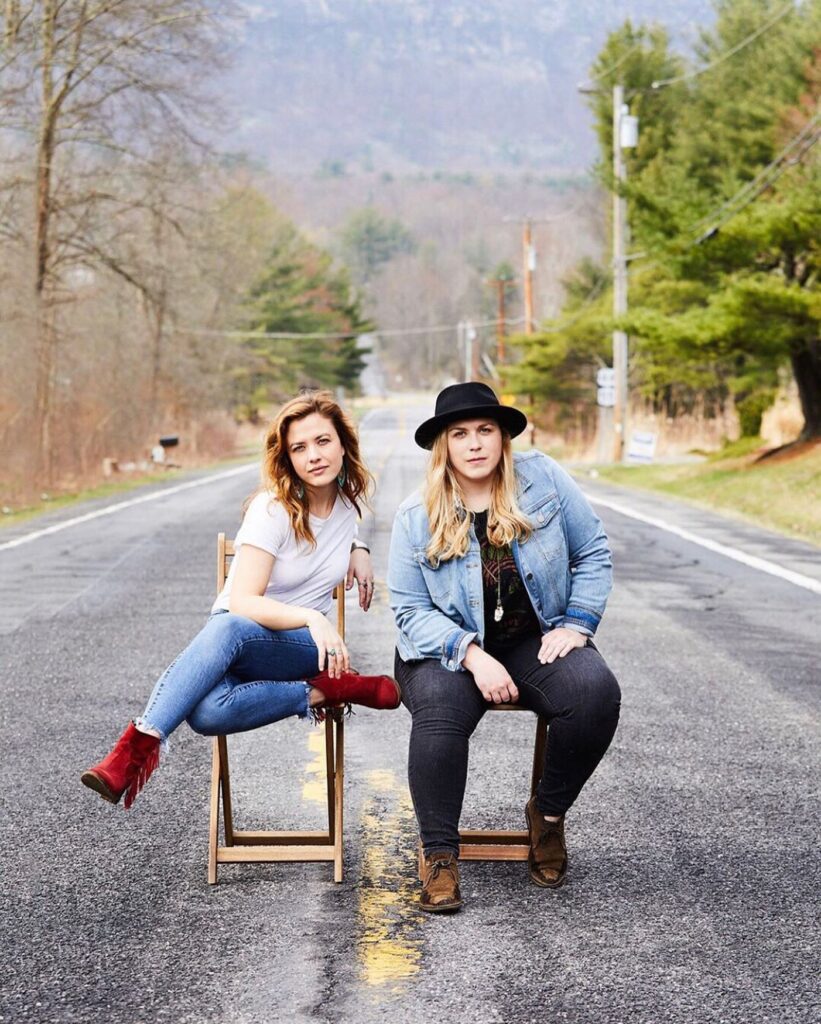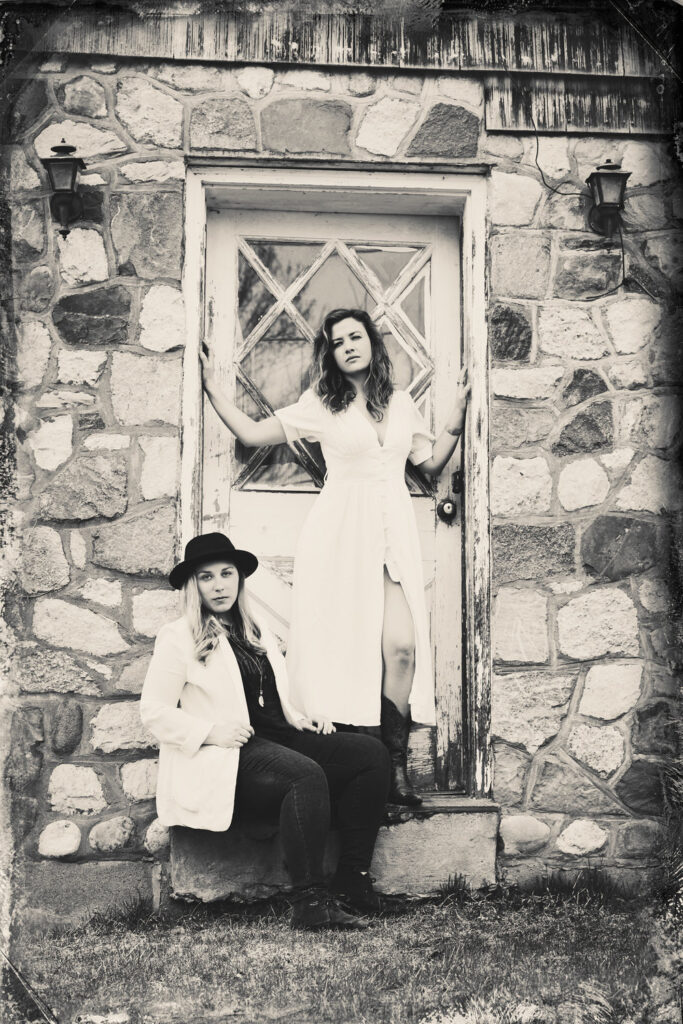Mother’s Daughter Come Out With “Give It Time”
Queer Country Anthem to Benefit Black Banjo Project
By James Barker, Staff Writer

With intricate banjo playing and harmonies that evoke the strength and beauty of the mountains, Mother’s Daughter’s ‘Give It Time’ had me hooked on first listen. The band is a collaborative music project from friends and musicians Jessie Standafer and Alexa Wilkinson, whose musical partnership is built on their shared Americana and folk roots. ‘Give It Time’ tells the story of a gay girl coming out to a tight-knit conservative family in a small mountain town in Idaho.
Proceeds from this release will go toward the Black Banjo Reclamation Project, a vehicle to return instruments of African origin to the descendants of their original makers. As country music still fails to properly reckon with its racism, cultural appropriation and white supremacy (of which the banjo is a big part), this project is vital.
‘Give It Time’ takes us through the motions of coming out in a small-town mountain community. As many of us have experienced, the initial coming out can be fraught and it can take time for our relationships with our families to heal. The first verse uses the mountain lake as a place of refuge to ‘wash away’ these struggles and to be safe in her girlfriend’s arms. ‘Give it Time’ beautifully represents the mountain lake as both a backdrop to conservative, familial homophobia, and the source of refuge and liberation for LGBTQ+ people. The banjo playing and harmonies further support the song’s expression of the unique experiences of queer life and struggle in the country.
The rest of the song explores the singer’s struggle for acceptance after coming out to her mother. The singer assures her mother that she’s ‘still the same’. The song even acknowledges the mother’s feelings who is ‘scared’ and is adjusting to her daughter’s life not being what she ‘had planned.’ The singer is not prepared to compromise who she is and who she loves for this, but by including this dialogue within this song, ‘Give It Time’ acknowledges the importance of this relationship, our family and our history as a key part of who we are as LGBTQ+ people.
As LGBTQ+ people we often have a journey to take pride in who we are, but belonging and acceptance from our family and community is also important to us. To accept ourselves we sometimes have to risk being rejected by others. As much as we hope that if we ‘give it time’ we will be unconditionally accepted, our self-worth is non-negotiable.
I was lucky not only to hear the song ahead of its release, but to chat to the band about their songwriting, the song and what it’s like coming out and living as LGBTQ+ in small-towns.

JB: What was the band’s songwriting process like for ‘Give It Time’?
Alexa: Our writing process is entirely collaborative, which is core to how we operate as a band. Producing this song during a pandemic was definitely a challenge! We were no longer able to be in the same space to track emotional vocal takes or sing as we would live, which isn’t ideal, but we are problem solvers and pretty resilient in the face of change. We both built our homes into fully functional studio spaces and sent takes back and forth to each other throughout the recording, mixing, and mastering process. ‘Give It Time’ was entirely self-produced, and it has been amazing expanding on my production capabilities while working with Jessie. It feels pretty remarkable to be in a musical partnership based on mutual respect and trust for each other’s skills and talents.
JB: What are some things about coming out in rural / small-town communities that people might not know?
Jessie: Every summer of my life, my mom’s life, and my grandmother’s life, we’ve been going to our family cabin in a small town in Idaho to reconnect with cousins, swim for hours in the lake every day, make huckleberry pancakes together, and chat with neighbors at the small church on Sundays. Some of my earliest memories are of the time I spent there, full of love and family and time on the lake. In elementary school, I wrote an essay about the lake being my favorite sound I’d ever heard, so writing a song about it feels very full-circle. I was going to take my girlfriend there for the first time this summer if it weren’t for a global pandemic derailing our plans!
According to my mom, my great-grandfather, who was a doctor during the Spanish Flu pandemic, first went to this lake town in the mountains to recover and heal from the mental and emotional toll of this health crisis in the US. The cabin became a very special respite for him. I believe that it continues to be a healing space, and is part of the reason why I decided to come out to my parents there. I hope that healing power is translated through this song.
Alexa: The story told in the lyrics is uniquely Jessie’s experience, but the themes are relatable to any person working to accept who they are. In learning about this place that is a core part of who Jessie is, the place that feels like home, I’ve seen my own experiences reflected having grown up in a small town in Utah. As a person who came out later in life, I did not have the experience of coming out in that small town, specifically, but I always wondered if I didn’t feel free to come out earlier because of the dynamic and culture of where I grew up. But as this song says, we can give ourselves the time to figure it out, and through loving ourselves, we find our chosen family. That’s what this band and our music feels like: home.
JB: What truth is there in stereotypes of small-town homophobia?
Jessie: Small towns and religious communities are absolutely not inherently anti-LGBTQ+; in fact, incredible LGBTQ+-affirming advocacy happens within these communities and can be a force for progress within culture at large. The small town referenced in ‘Give It Time’ has given me some of my fiercest allies, and I think this is because they see every neighbor, regardless of race, religion, sexuality, or class, as valuable to the community as a whole. But the reality is that ultra conservative ideology does have a stronghold in some religious communities, including the one my parents raised me in.
We are all a product of our environments in a lot of ways, but ultimately, we get to decide what to do with those experiences, and who we want to be. I think those of us who grow up in tight-knit communities can sometimes be made to feel like we have to choose between who we are and where we come from. But I firmly believe that my family’s cabin and the lake and the land there are just as much a part of me as they are to the rest of my family. Being gay doesn’t change that. No one can take our faith or our roots from us.

Alexa: That’s exactly why we named our band Mother’s Daughter. Our mothers and our mothers’ mothers made us who we are, in good ways and in hard ways, and we have the privilege of continuing to create ourselves and our futures. We are our mothers’ daughters – so what do we want to create?
We wrote ‘Give It Time’ to intentionally create a bridge between our shared identity as gay women with the Americana music genre – a style that is typically seen as quite heteronormative. We use musical elements that resonate with both of us and are such a big part of our respective families’ musical past. The tight vocal harmonies, the bright banjo accompaniment, the boot-stomping base, all together make us feel we are on the deck of Jessie’s cabin, having a big family jam session.
Mother’s Daughter’s ambition is to be ‘the bridge that connects past to present, matter to spirit, tradition to progress.’ With ‘Give It Time’ the band are well on their way to building this bridge. For fans of progressive Americana or traditional country alike, you can’t do much better than this. And for country queers out there going through struggles coming out, I hope the musical lake in ‘Give It Time’ will provide at least some people with some of that same healing power.
Mother’s Daughter will be releasing a lyric video for “Give It Time” in mid-October, with video footage from a band camping trip earlier this month. They have several projects pending release, including a very queer winter holiday album.